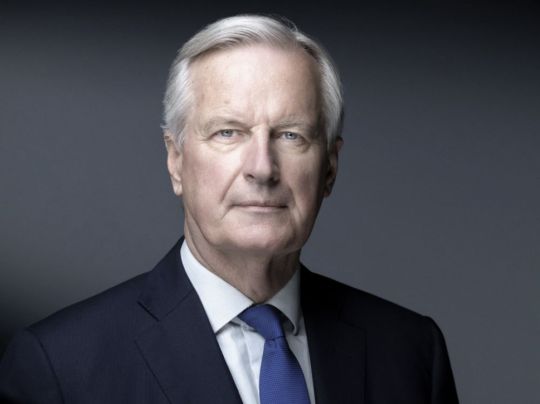#Michel Barnier
Explore tagged Tumblr posts
Text

(Source)
It is unclear where that leaves France's government for the immediate future — because of President Macron's odd decision to call snap elections that led to the current nearly-three-way-split legislature, no further elections can be called until the summer.
#destiel#world politics#france#michel barnier#prime minister barnier#french politics#politics#castiel#dean winchester#breaking news
370 notes
·
View notes
Text

Wednesday’s crucial vote rose from fierce opposition to Barnier’s proposed budget.
The National Assembly, France’s lower house of parliament, is deeply fractured, with no single party holding a majority. It comprises three major blocs: Macron’s centrist allies, the left-wing coalition New Popular Front, and the far-right National Rally. Both opposition blocs, typically at odds, are uniting against Barnier, accusing him of imposing austerity measures and failing to address citizens’ needs.
source 1
source 2
source 3
#destiel meme news#destiel meme#news#world news#global politics#french politics#france#michel barnier#france politics#emmanuel macron#prime minister#what is happening in global politics#it really is just major historical event after major historical event#maybe i just want to live in boring times for a little while
144 notes
·
View notes
Text
05 / 09 / 2024
This man is Michel Barnier, a former minister. Today, after more than 50 days without Prime Minister, President Emmanuel Macron named him the new Prime Minister of the French Republic.
He is very tall (1m90/6'2)


He is aged 73 and I'm sure a lot of people who likes (suited) (straight) (white) (rich) daddies will soon be into him. And you? 😁




youtube
@dadsinsuits
137 notes
·
View notes
Text
📰 "Budget: 49,3, censure .... M.Barnier joue gros...Ça va être une boucherie ..." 🗞
LCI
Source : X
#short video#journal#news#newspaer#budget#impôts#lci#michel barnier#censure#parlement#cute monkey#singe#tour eiffel#funny video#fidjie fidjie
51 notes
·
View notes
Text

Jean-Claude Juncker & Michel Barnier
#suitdaddy#suiteddaddy#suit and tie#suited daddy#men in suits#suited grandpa#suitedman#silverfox#suitfetish#kiss#suited men#buisness suit#suited man#suitedmen#French man#French men#Jean-Claude Juncker#Michel Barnier#luxembourgish man#luxembourgish men
91 notes
·
View notes
Text

France and South Korea are imploding in unison. It’s the romance of the year
#shitpost#current events#french politics#south korean politics#yoon suk yeol#marine le pen#michel barnier
17 notes
·
View notes
Text


(via reddit)
16 notes
·
View notes
Text
12 notes
·
View notes
Text
France is barreling toward a perfect storm of political and financial crisis as 2024 comes to a close. Marine Le Pen’s far-right National Rally is threatening to pull the plug on the fragile coalition government led by Prime Minister Michel Barnier over the conservative grandee's plans to rein in the massive French deficit. In a dramatic move, Le Pen gave Barnier until Monday to answer her demands and amend his government's budget plans.
Continue Reading.
8 notes
·
View notes
Text
The Guardian:
France has been plunged into political crisis after a no-confidence vote brought down the government, ending the beleaguered minority coalition of the rightwing prime minister Michel Barnier after only three months. The no-confidence motion brought by an alliance of left-wing parties was supported by MPs from Marine Le Pen’s anti-immigration, far-right, National Rally. A total of 331 lawmakers — a clear majority — voted on Wednesday night to bring down the government. Barnier will resign as prime minister on Thursday morning, having warned before the vote that France would be “plunged into the unknown”. Macron will then address the nation in a televised address on Thursday evening, his office said after the vote.
The toppling of the government leaves the president, Emmanuel Macron, facing the worst political crisis of his two terms as president. There is uncertainty over how a 2025 budget can be decided as France faces a growing public deficit, and over whom Macron could appoint as prime minister. Macron, whose second term as president runs until spring 2027, is not obliged to stand down himself. He has ruled out resigning, calling such a scenario “political fiction”. But part of the left and far right called for his exit. Wednesday’s vote was the country’s first successful no-confidence vote since a defeat for Georges Pompidou’s government in 1962, when Charles de Gaulle was president. The lifespan of Barnier’s government became the shortest of any administration of France’s Fifth Republic, which began in 1958.
France is in turmoil, as PM Michel Barnier fails to survive a no-confidence vote.
6 notes
·
View notes
Note
À votre avis barnier peut il faire avancer l’écologie? Et le modèle économique libéral de barnier et Macron peut il être compatible avec plus de dépenses pour les services publiques ? Pourquoi des médias comme le monde relaye cela ?
"Je parle notamment de cette vidéo de Le Monde : Quelles sont les idées politiques de Michel Barnier ? Comprendre en trois minutes. Qu’en pensez-vous vous de ce qu’y est dit ?"
"Michel Barnier a-t-il fait des choses importantes dans sa carrière pour le social et les services publics comme le disent les médias ?"
Plusieurs questions qui tournent autour d'un même thème, je fais une réponse groupée qui laisse toutefois de côté certains éléments de vos questions donc n'hésitez pas à rebondir à partir de ma réponse.
Michel Barnier est un pur politicien si on peut dire, il a un énorme parcours politique donc il a du faire du bien comme du critiquable au cours de sa très (trop) longue carrière. Il serait intéressant de comparer ses prises de position avec les positions du parti auquel il appartenait, pour déterminer si c’était un élu qui respectait les consignes de son parti ou s’il faisait parfois preuve de dissidence (et il faudrait voir s’il adoptait plus souvent une position plus progressiste ou non que son parti). Mais je n’ai pas le temps de faire ça actuellement, donc on s’en tiendra à quelques moments clés du parcours de Barnier. Le matériel source est bien évidemment la page wikipédia du concerné.
En ce qui concerne l’écologie :
Il a eu un ministère de l’écologie en 1993, à la tête duquel il a notamment porté la loi n° 95-101 du 2 février 1995 relative au renforcement de la protection de l'environnement. Celle-ci va notamment inscrire le principe de précaution dans le droit interne : peut-être témoin de l’engagement de Barnier en faveur de l’écologie, c’est surtout la nécessaire traduction en interne du principe de précaution adopté dans le cadre de l’UE en 1992.
Notons aussi la « taxe Barnier », qui taxe les entreprises de transport maritime sur les passagers embarqués à destination d’espaces naturels protégés (en sont bénéficiaires les gestionnaires des parcs nationaux, des réserves naturelles etc. – elle ne rapporte pas grand-chose, mais c’est toujours ça).
S’il faut bien lui mettre ces mesures à son actif, notons que par rapport à sa très longue carrière, son engagement en faveur de l’écologie (au moins au niveau national – peut-être son engagement au niveau local me ferait mentir) reste très limité, peu ambitieux et surtout, il date. A la tête du ministère de l’environnement, on peut penser que son bilan est vraiment le strict minimum de ce qu’on pourrait faire. Ainsi, dire qu’il a « un intérêt constant pour l’écologie » (je cite la vidéo mentionnée dans la question) me semble assez exagéré.
En ce qui concerne le social :
On peut relever plusieurs moments importants de la carrière de Barnier. En 1981, il vote en faveur de l’abolition de la peine de mort (grand seigneur – peu d’élus de droite été étaient favorables). La même année, il vote contre la dépénalisation des relations homosexuelles entre personnes de plus de 15 ans (donc y compris entre adultes consentants...). L’année suivante, il vote contre le projet de remboursement de l’IVG par la Sécurité sociale. Pas grand-chose de très récent donc, ni de très surprenant pour un élu de droite.
Plus récemment, on peut mentionner sa proposition (après l’annonce de sa candidature à la dernière présidentielle) de mettre en place un moratoire de trois à cinq ans sur l’immigration dans l’Union européenne (hors étudiants et demandeurs d’asile), soi-disant pour « pouvoir étudier les problèmes liés à l’immigration en France » (comme si empêcher les gens d’arriver en France changeait fondamentalement la donne pour l’étude des problèmes). Par la suite, il est d’ailleurs revenu sur cette proposition : pour proposer de réduire y compris l’accueil des étudiants étrangers !
Mentionnons surtout son programme pour la dernière présidentielle qui va vous montrer que la préoccupation de Barnier, ce n’est ni l’écologie, ni les services publics. Voici ses propositions phares :
Baisse des taxes pour les entreprises françaises
Baisse des cotisations sur les salaires moyens et suppression des charges pendant 3 ans pour le premier emploi d’un jeune
Augmentation de l’âge légal de départ à la retraite de 62 à 65 ans (on est à deux doigts de féliciter Macron d’avoir repoussé uniquement à 64 ans)
Revenir sur les 35 heures hebdomadaires (si si, à l’époque où certains pays expérimentent la semaine de 4 jours)
Instauration d’une aide sociale unique en lieu et place des aides sociales actuelles et conditionnée à une disponibilité du bénéficiaire, notamment pour « effectuer des activités utiles à la collectivité ou en entreprise »
En somme, un programme de droite et très Macron-compatible. D’ailleurs, il faut relever la proximité qui existait déjà entre Barnier et Macron (et son entourage) : soutien de Bruno Le Maire pour la primaire française de la droite et du centre en 2016 ; pressenti par le camp présidentiel pour la présidence de la Commission européenne en 2019…
Tout cela n’est donc pas très fameux comme bilan, à mon humble avis. S’il se définit comme « gaulliste social », je peine à voir comment s’est exprimé son engagement en faveur des classes moyennes et des services publics, d’autant plus quand il défend au contraire un programme de �� baisse des charges » dont on sait qu’une telle baisse des cotisations sociales ne peut se traduire que par une remise en cause des droits sociaux des personnes.
La vidéo mentionnée dans la question rappelle bien que dans ses dernières prises de position, on peut voir un « durcissement » dans ses propositions mais c’est peut-être aussi simplement que, très occupé par la question européenne, il ne prenait pas trop position sur ces autres questions.
Mais en même temps, si les gens de droite étaient de gauche, ça se saurait !
7 notes
·
View notes
Text
We have a new government. Finally. Ah. Ah.
5 notes
·
View notes
Text
3 mois et puis s'en vont

Je lui ouvre où pas

4 décembre 2024
4 notes
·
View notes
Text




























Michel Barnier in Real Gay Fantasy !
53 notes
·
View notes
Text

Dessins de la semaine 😁 .... 😏




Dessins de presse de Gros, Sié, Pez, Goubelle, Chaunu, The Economist.




👋 Bel après-midi

#art#illustration#dessin de presse#actualité#humour#funny pics#censure#notre dame de paris#michel barnier#macron#sié#chaunu#goubelle#gros#pez#the economist#bel après-midi#fidjie fidjie
47 notes
·
View notes












